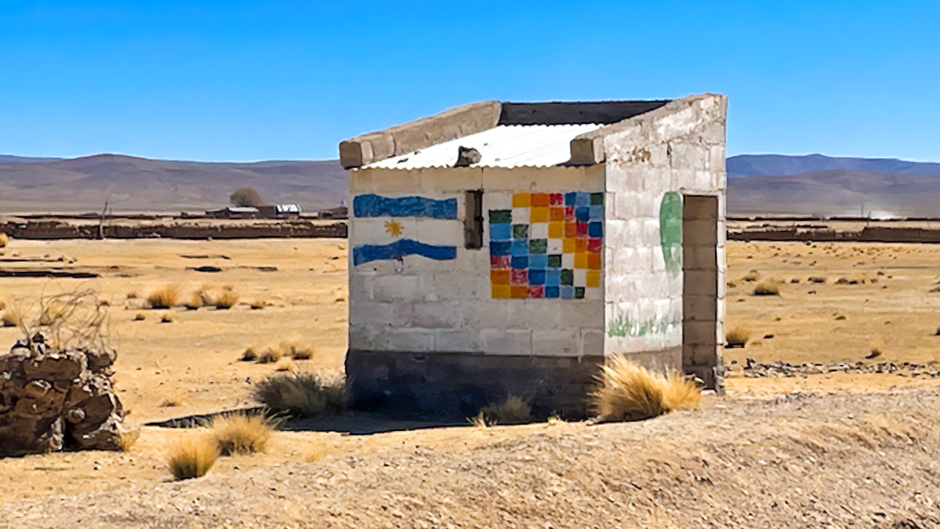The Indigenous people in Argentina, many of whom live in the northwest region of the country, have been treated as second-class citizens by their country for centuries. Many live in poverty and have the least access to education among the national population.
Among the injustices these groups have faced is the increasing incursion into their traditional territories by companies that mine lithium and other valuable resources.
Tracy Devine Guzmán, an associate professor who teaches Latin American Studies and Global Indigenous Studies for the University of Miami College of Arts and Sciences, spent a month last summer researching the historical and current circumstances of Indigenous communities in northern Argentina for her book on transcontinental indigeneity.
Her work in progress has been funded, in part, by a Provost’s Research Award. Devine Guzmán presented her findings at the University’s Institute for the Advanced Study of the Americas (UMIA) on Oct. 30 during a session titled “Arriba las wiphalas, abajo la reforma” (Up with the wiphalas, down with the reform)—a phrase currently employed by Kolla communities in Jujuy to protest recent changes to the provincial constitution. The wiphala is a pan-Andean flag and an important political and cultural symbol for Indigenous people across the region.
According to Devine Guzmán, on June 20 the provincial government of Jujuy passed its first constitutional reform since 1986.
“The reform included measures that were highly controversial for violating Indigenous rights,” said Devine Guzmán, including “facilitating the incursion of international lithium mining interests into a fragile ecosystem and curtailing the ability of all jujeños (people from Jujuy) to protest legally against their state.”
The reform passed without public debate or referendum, having been pushed through in just a few weeks’ time and behind closed doors, she pointed out.
Upon final approval, the new provincial constitution entered into contradiction not only with Argentina’s National Constitution, from 1994, but also with International Labor Organization Convention 169, which protects the right of Indigenous people to prior consultation regarding use of their traditional lands. The Argentine Congress passed a law ratifying of ILO 169 in 1992, and it was enacted in 2000.
“To protest these reforms, thousands of Indigenous activists and supporters took to the streets in the ensuing days and weeks, using the very tactic that had been outlawed by the state: roadblocks,” Devine Guzmán said.
The protests, which are ongoing, have blocked traffic and disrupted commerce and tourism at a time when Argentina is undergoing one of its most dire economic crises, with inflation at 138.3 percent as of September—the highest level since the early 1990s, Bloomberg reported.
Argentina is also about to choose a new president later in November during the second round of elections. The two candidates are Javier Milei, a far-right, former television pundit, and Sergio Massa, the current economic minister.
“In the context of Argentina’s charged political climate and during this season of bitter political campaigning, the popular sentiment regarding Indigenous protests has further split an already deeply divided electorate,” Devine Guzmán noted.
Many Indigenous protestors in Jujuy have taken to social media, appealing to national and international organizations to support their efforts, she added. Through social media, they have joined forces with other Indigenous communities and individuals to bring national and global attention to their cause. They also have sought backing from prominent international figures—like Nobel Prize winner, Argentine activist and writer, Adolfo Pérez Esquivel, and Swedish environmental activist, Greta Thunberg—to highlight their demands.
Devine Guzmán aims to show how, by engaging in activism alongside Indigenous people and allies in neighboring states and around the world, Kolla, Quechua, Guaraní, Mapuche, and other communities are demanding recognition of their rights as native people and Argentine citizens. Both legal knowledge and communication technologies, including social media, are key to these efforts.
Indigenous people in Argentina also are challenging the mores of the dominant society, which historically has considered them (and other underserved communities) inferior to the white majority population, she affirmed. The Indigenous movement combines environmental and anti-racist activism.
The road ahead will not be easy for these communities or for others who care about the environment, Devine Guzmán states. Milei is a climate-change denier, and Massa an enthusiastic supporter of lithium mining to help solve the country’s financial woes.
But the resolve of the Indigenous protestors is unwavering, Devine Guzmán explained. By continuing to raise global awareness about the human and ecological costs of extractivism, they insist that Argentina cannot continue to sacrifice the well-being of Indigenous people and the Earth for the sake of economic growth and development.

